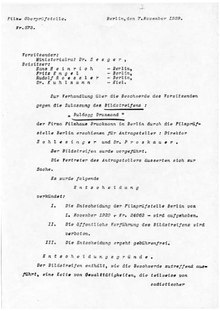Bulldog Drummond (1929)
| Movie | |
|---|---|
| Original title | Bulldog Drummond |
| Country of production | United States |
| original language | English |
| Publishing year | 1929 |
| length | 90 minutes |
| Rod | |
| Director | F. Richard Jones |
| script |
Sidney Howard , Wallace Smith |
| production | Samuel Goldwyn |
| music | Hugo Riesenfeld |
| camera |
George Barnes , Gregg Toland |
| cut |
Frank Lawrence , Viola Lawrence |
| occupation | |
| |
Bulldog Drummond is an American crime film from 1929. The screenplay is based on a series of novels by Herman C. McNeile.
action
War veteran Hugh Drummond, dubbed Bulldog by everyone, is bored with life after the war. The young British officer wants to experience adventure. When the American Phyllis Benton approaches him with the request to free her uncle from a nursing home, he accepts the assignment.
Phyllis believes her uncle, Hiram Travers, is being told by the sadistic director and medic, Dr. Lakington was held prisoner and had to endure medical tests and torture. It turns out that Lakington is trying to eliminate human happiness through torture. With the help of his friend Algy, Bulldog manages to get Travers out of the home, who is pumped full of obscure drugs. In doing so, Bull wins Phyllis' love and uncle's gratitude.
background
The premiere took place on May 2, 1929.
The film was quite successful. With an estimated budget of 550,000 US dollars (7,449,000 euros), he brought back 1.6 million US dollars (23,838,000 euros) worldwide.
The character of Bulldog Drummond had been filmed twice before: in 1922 Carlyle Blackwell Sr. played the ex-soldier in a film by Oscar Apfel and in 1925 Jack Buchanan, directed by Sidney Morgan . Both were silent films . The Ronald Colman film was the first Bulldog Drummond film with sound. Ronald Colman played Drummond again in 1934 in Bulldog Drummond Strikes Back , directed by Roy Del Ruth . Later a small film series was made with the fictional character. Actors included Ray Milland and John Howard .
Censorship in Germany
The film was submitted to the censorship on November 1, 1929 in a seven- file version (at 2045 meters). He was admitted with a youth ban. In response to an immediate complaint from Ministerialrat Dr. Seeger , the film was checked again on November 7, 1929 and the showing in the German Reich was banned because the film contains "a chain of acts of violence, some of which are sadistic cruelty" and the plot is "too realistic" to be shown by " Viewer can be perceived as unreal or grotesque ”.
Reviews
Mordaunt Hall of the New York Times finds the film a pleasant take on the original. It is the best and most enjoyable piece of film work of its kind. Variety praised the film as a highly entertaining thriller with a sympathetic Ronald Colman.
Awards
At the third Academy Awards in 1930 , Ronald Colman was nominated for the Oscar for Best Actor .
Web links
- Bulldog Drummond in the Internet Movie Database (English)
- Bulldog Drummond at Turner Classic Movies (English)
Individual evidence
- ↑ See Business on imdb.com
- ^ Mordaunt Hall : A Smiling Melodrama . In: The New York Times , May 3, 1929.
- ↑ See Bulldog Drummond . In: Variety , 1929.
